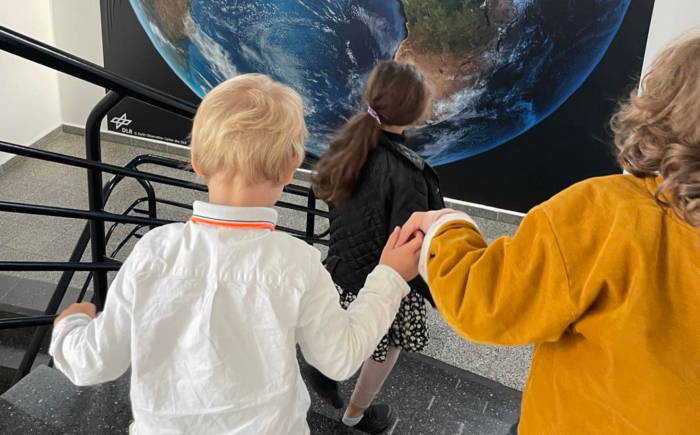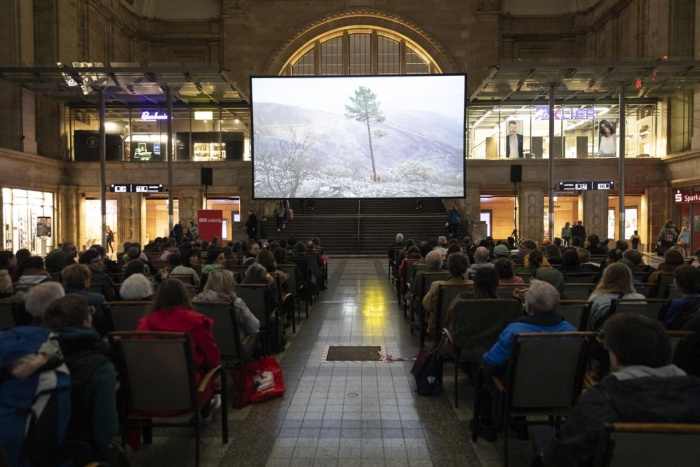In autumn, the Docudays UA team traditionally travels around the world's film festivals to develop a dialogue about Ukrainian documentaries and find new warm collaborations. Darya Averchenko, the director of the festival's communication department, producer and screenwriter, shares her observations about German audiences and the industry.
In October, I had the opportunity to visit two German festivals: The Ukrainian Film Festival in Berlin and Dok.Leipzig. Two completely different venues within an hour's train ride from Berlin to Leipzig. I used to think that Ukrainian festivals abroad were an event only for our diaspora. We talk a lot now about how important it is to work with Ukrainians abroad, both to inform our compatriots about the situation at home and to help ease their loneliness, talk about the time of return and rebuilding the country. However, to my surprise, I also met many Berliners at the festival who watched the films and actively asked questions during the discussions, which did not coincide with the Facebook vibe ‘The West is tired of the war in Ukraine.’
Hall of the planetarium at The Ukrainian Film Festival in Berlin. Darya Averchenko
The Ukrainian Film Festival Berlin took place for the fifth time during the week at 10 locations in the centre of Berlin. The programme included feature films and documentaries by mostly Ukrainian authors, a short film competition, special screenings of Ukrainian film archives, and a retrospective on the 100th anniversary of Parajanov's birth. I was invited to a panel discussion titled ‘Film as Resistance: Artistic Practices for Strengthening Resistance to Disinformation’. In the cosy cinema hall of the Berlin Planetarium, we watched the film Kilometre by Hanna Tycha (by the way, the film was supported by the DOCU/HELP project at the beginning of the full-scale invasion). And after the screening, we talked about what each of us can do in our own place to counter Russian propaganda. I talked a lot about the Ukraine War Archive, about the hundreds of testimonies and millions of videos that the project team has collected since its foundation in March 2022. About the Witnesses series of films, which we continue to make based on recorded interviews with civilians and military personnel, telling the world about such tragic events as the uninvestigated terrorist attack in the village of Olenivka.
Panel discussion at the Ukrainian Film Festival in Berlin. Reckless Anny
I also talked about another Docudays UA project, an annual catalogue of Ukrainian documentary films, with contacts of professionals working in Ukraine and fresh films that we are ready to offer to international festivals. One of the audience members came up to me to shake my hand and said: ‘We are outraged by the slowness of our government. But you should know that ordinary Germans are always on the side of Ukrainians in this unjust war. We do what we can: we donate, we tell our people about meetings like this one. Please, more information and ambassadors. Festivals like this one are very important!’
We went to Dok.Leipzig together with a part of the Berlin festival team. Unfortunately, there was no mention of our war at the opening ceremony. And the only live performance was a speech by a Georgian documentary filmmaker who received a prize for the development of her project, but she said that her heart was in Sakartvelo, where elections are underway and she wants to support everyone who is going through difficult times in their countries. ‘Our pain is common!’ she said, unable to hold back her tears.

Screening at the railway station. Dok.Leipzig. Photo from the festival website
For some reason, I thought that they had to show us at least a Georgian, if not a Ukrainian film, to emphasise the importance of the festival. However, the festival opened with a slow and rather banal film about light, Tracing Light by Thomas Riedelsheimer. We left the hall and went to the railway station. Why the train station — because it was at the Leipzig Hauptbahnhof that a crowded screening of Flowers of Ukraine by Adelina Borets was taking place. I must say that this is an annual tradition of the festival. But this time, I was pleased to see that there were so many viewers: they were sitting on the floor on both sides of the hall equipped with chairs. It looked like a holiday and that's exactly how I imagined the opening of the festival! This is definitely something that I would like to borrow for Docudays UA's open screenings, which we have stopped practising in recent years because of security issues. I was also pleased that Dok.Leipzig continues to present Ukrainian projects at the rough cut stage of Generation Ukraine. However, it was a small hall that could not accommodate everyone who wanted to listen. One of the most notable projects was the film Palingenesis by Alina Horlova, Yelyzaveta Smith, and Semen Mozgovyi. The film is about the death addiction syndrome that Ukrainians developed during the war years, but also about rebirth and faith in people who can withstand trials. I am sincerely rooting for all 5 films presented and wish them worthy world premieres. And, of course, a Ukrainian premiere at the next Docudays UA.
I am grateful to the Docudays NGO, DOC.Alliance and DOK.Leipzig for their support in organising the trip.
Main photo: Panel discussion at the Ukrainian Film Festival in Berlin. Reckless Anny